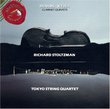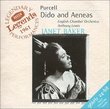| All Artists: Johannes Brahms, Emanuel Ax Title: Brahms: Handel Variations op 24, Six Piano Pieces op 118, Two Rhapsodies op 79 (CBS) Members Wishing: 0 Total Copies: 0 Label: Sony Original Release Date: 1/1/1992 Re-Release Date: 6/2/1992 Genre: Classical Style: Number of Discs: 1 SwapaCD Credits: 1 UPC: 074644804621 |
Search - Johannes Brahms, Emanuel Ax :: Brahms: Handel Variations op 24, Six Piano Pieces op 118, Two Rhapsodies op 79 (CBS)
 | Johannes Brahms, Emanuel Ax Brahms: Handel Variations op 24, Six Piano Pieces op 118, Two Rhapsodies op 79 (CBS) Genre: Classical
Emanuel Ax obviously knows exactly what to do with all of this music, but he doesn't do it consistently. He plays the difficult Variations with everything perfectly in place, an amazing pianistic feat in itself. This wor... more » |
Larger Image |
CD DetailsSynopsis
Amazon.com Emanuel Ax obviously knows exactly what to do with all of this music, but he doesn't do it consistently. He plays the difficult Variations with everything perfectly in place, an amazing pianistic feat in itself. This work has some excitement and grand climaxes built into it, and Ax minimizes them, giving us Brahms sounding politer than the composer may have intended. He obviously does what he does on purpose, since he whips up exciting climaxes in the Rhapsodies. He also plays the late Piano Pieces very beautifully, almost enough reason in itself to buy the disc. But compare what Leon Fleisher does with the Variations (Sony MH2K 63225). --Leslie Gerber Similar CDs
Similarly Requested CDs |
CD ReviewsOne of the greatest piano recordings Frances Hedley | France | 03/21/2008 (5 out of 5 stars) "Having listened to over 35 recordings of Brahms's magnificent Handel Variations for a 'collector's guide' to the work published in the January/February 2008 issue of International Piano magazine, I can say that Ax's is by far the finest. 'Compare Leon Fleisher', says Mr Gerber. I have. Here is what I wrote about him: 'Fleisher too often drives the music: Variation 2 is not just animato but agitato, 10 is mechanical, 12 (the only variation marked pp more or less throughout) nowhere near soave (gentle) or 18 grazioso, and 25 is absurdly drilled. His tone is brittle and occasionally aggressive (the harsh recording hardly helps). 6, 19 and 22 are attractive, but pauses after 4, 6, 10, 12, 13 and 22 undermine any sense of direction.' Unquestionably, Ax's is the recording to have and, with equally impressive couplings, the disc as a whole is one of the greatest piano recordings of all time. Buy while stocks last (Sony has unaccountably deleted it)." EXCEPTIONAL VARIATIONS James Wegg | ST. CATHARINES, ON | 12/29/2001 (4 out of 5 stars) "Whatever drew Brahms to Handel's eight bars of stately, constrained melody, whose range is limited to an octave and whose notes never stray outside the eight notes of their Bb major home scale, will remain a musicological mystery! But compositionally their very "simplicity" is ideal for the incredible journey penned by the master variationist of his time.Emanuel Ax seems as eager as the composer to share the wealth of ideas, sudden turns, unexpected harmonies and rhythmical drive that makes the twenty-five minute performance time disappear in a heady wink.I last heard Ax some fifteen years ago where he tossed off the fiendishly difficult Khachaturian concerto at an American Symphony Conductor (now defunct) under the direction of my mentor Kazuyoshi Akiyama. His mastery of the keyboard was dazzling but at the time he wouldn't have been my first choice for the subtleties and breadth of another piano master. How wrong I can be.This recording reveals a pianist who has all the tools: impeccable technique, rhythmic accuracy, endurance! but also the all too frequently missing talent of revealing the subtext of the art. He is a worthy advocate.The aria is played just so - clean clear and subdued. Imagine being at the premiere and wondering what Brahms was up to with this wee tune!Both Brahms and Ax waste no time announcing their intentions to push and pull the theme until it has revealed all of its undercurrents. Variation 1 is a nickel short of jazz and immediately brings Handel's music into the modern age. The lack of harmonic colour in the theme is beautifully foiled with the chromaticism of Variation 2 and the three against two conflicts between right and left hands provides a tension and flow unknown to the Baroque master.Variation 3 plays unirhythmic peek-a-boo where Variation 4 provides a healthy does of octaves that are rendered with great aplomb by Ax. Many composers would be hard pressed to have this much variety in these opening minutes, but Brahms has just "done his technique."Only Brahms could have written Variation 5. The tonic minor (with all 5 flats) seems worlds from its major namesake. The counterpoint of the two hands - no mere "tune and accompaniment" and the many dynamic shades take the breath away and Ax delivers its inner beauty with a calm that demonstrates special understanding.Variation 6 is a textbook canon that provides the perfect contrast to the intimacy of its predecessor. 7 & 8, con vivacita, - now back in the major - have relentless drive that can only be dispelled by the brief silence Brahms inserts at their surprisingly quiet close. Was that a dream? The first section is over.Now Brahms has armed to his subject and is ready to stretch the bounds of his subject. Ax's responses to the luxuriant legato of 9, the mischievous indecision of 10 and the sublime music-box of 11 are entirely appropriate. My only quibble with his playing is my penchant for even greater dynamic contrast, particularly the "small" crescendos and accents that are to be found in nearly every variation.Now the variations start to link. The quiet, uncertain understatement of 12 sets the table beautifully for the return of the dark tonic minor in 13, where Brahms drops the repeat of each section and begins writing variations on the variations - this wonderful skill is most famously used in the first movement of the fourth symphony where conductors no longer have the "luxury" of skipping the repeat of the exposition! The constant sixteenths of 14 & 15 keep the pianist busy and the listener engaged; 16 develops through counterpoint where 17 is a study in long and short. 18 brings dialogue - finally the left and right begin to talk to one another. 19 is the most "baroque" of the bunch. It's relaxing triple metre (a favourite of Handel's) provides a welcome respite from the wide range of expression experienced so far, but also quietly whets our curiosity for what might come next. Again Ax rises to the occasion and delivers perfect rhythm and masterful ornaments.Variation 20 shows double darkness: deep two-sided chromaticism and a shuddering, searching dynamic shape. Nothing is settled but the final resolution to Bb through the very far door of Gb on the second last beat is one of the most exquisite moments in the entire work - and Ax's weight and slight hesitation shows that its significance has been understood.The mist of Variation 21 comes from the subtle combination of three over four (triplets/sixteenths) and the unexpected foray into the relative minor. It's been along time coming but will not be re-visited.Safely back in Bb, the next four variations build on themselves: 22 uses naivety; 23 uncertainly - nearly fear; 24 nervous then a defiant 25. What could follow?Brahms presents Handel's theme in the most revered form of the Baroque - the fugue. Here we are given a four voice construction (complete with redundant entry). The trick is to listen horizontally, rather than our usual vertical (tune plus accompaniment) manner. Brahms develops the developed - he turns the shape upside down (inversion); slows its speed (augmentation) and through his mastery of both harmony and rhythm - particularly syncopated - manages to remove the bar line and just let the music go where it will. Truly the score is just a representation of the ideas. Ax navigates with purpose and skill so that when the clarion pedal F's arrive, the sense of joy and final resolution let us celebrate with him this astounding music that grew a wee "previously owned" theme into an affirmation of the human experience in the successful combination of notes and thought.Ax brings it home with authority and truth." Very good recordings of favorite pieces by Brahms Craig Matteson | Ann Arbor, MI | 07/05/2002 (4 out of 5 stars) "I believe Emanuel Ax is a better pianist than he often gets credit for being. He has never been a heaven storming virtuoso or a beloved poet of the keyboard. And yet he seems always to be able to do whatever he wants to do very credibly. I have never heard anything other than fine playing from him.Here we have some wonderful pieces by Brahms that most people love. I know I love them. Mr. Ax plays them very very well with great clarity and intelligence. He never seems to strain and has an intimacy with these pieces.If you asked me to pick a favorite from this album I would have to say that it would change from day to day. The Handel Variations are terrific, but so are the Op 118 pieces (I mean WHO DOESN'T LOVE THEM!?). And of course we have all tried our hand at the Opus 79 Rhapsodies. Mr. Ax has provided us with models we can enjoy and try to emulate. That is a wonderful service for all of us who love to play this music as well as listen to the recordings."
|

 Track Listings (35) - Disc #1
Track Listings (35) - Disc #1










